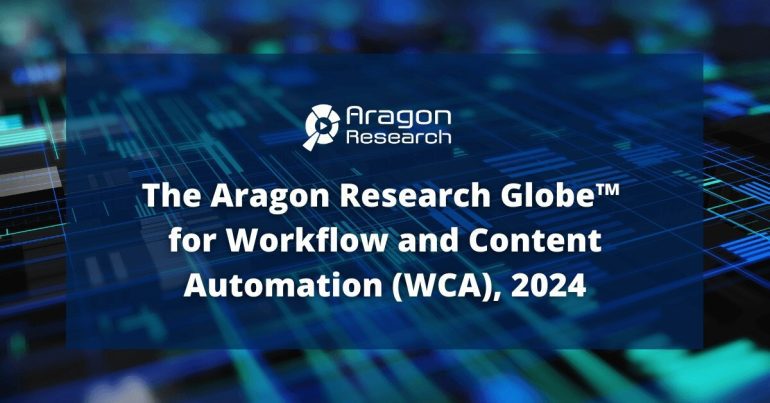- Aragon Research’s latest report delves into the transformative impact of generative AI and intelligent content assistants on content automation.
- Generative AI is revolutionizing content automation, enabling faster document processes.
- Intelligent content assistants are predicted to become ubiquitous, with 40% of providers expected to offer them by 2025.
- Custom generative content models tailored to organizations’ data are seen as the future of content automation.
- Despite WCA’s predominantly rules-based nature, the landscape is rapidly evolving towards automation driven by generative AI.
Main AI News:
The burgeoning era of AI is catalyzing a seismic shift in enterprise dynamics, particularly in the realm of content automation. Aragon Research’s latest unveiling, The Aragon Research Globe for Workflow and Content Automation (WCA), 2024, illuminates the trajectory of this transformation. In this epochal report, Aragon scrutinizes 12 leading providers in the WCA arena, spotlighting the disruptive potential of generative AI and intelligent content assistants.
Key Insights:
- Pioneering AI in Content Automation: Generative AI is ushering in a new era of efficiency in content automation, streamlining document processes with unprecedented speed. The ascendance of intelligent content assistants heralds a paradigm shift in how enterprises engage with and oversee content.
- Rising Tide of Intelligent Content Assistants: Aragon’s prognostication foresees the rapid ascent and adoption of intelligent content assistants, adept at distilling voluminous documents, composing emails, and even crafting intricate contracts. By the year 2025, a staggering 40% of Workflow and Content Automation providers are anticipated to incorporate an Intelligent Content Assistant into their offerings.
- Tailored Generative Content Models: The future of content automation lies in bespoke generative content models, such as Custom LLMs, tailored to harness an organization’s data reservoirs. This bespoke approach enables the curation of highly personalized and contextually relevant content.
- Evolving Landscape of WCA: While the foundation of WCA remains predominantly rules-based, the landscape is rapidly evolving. Enterprises are increasingly embracing semi- or fully automated document workflows, galvanized by the transformative potential of generative AI.
- Imperative for Business Metamorphosis: The advent of AI mandates an expeditious business metamorphosis. Enterprises must prioritize the automation of both customer-facing and internal documentation processes, meticulously scrutinizing WCA providers’ roadmaps to ascertain their proficiency in generative content capabilities.
According to Jim Lundy, CEO and Lead Analyst at Aragon Research, “The race to AI is intensifying pressure on enterprise transformation. In the realm of content automation, the age of AI is upon us. Intelligent content assistants are at the vanguard, catalyzing swifter content automation and routing, while generative AI stands poised to redefine the WCA landscape in the years ahead.”
The report evaluates 12 major WCA providers, encompassing industry stalwarts such as Adobe, Conga, Docusign, Dropbox, Ironclad, MHC Software, Mitratech, Nintex, OpenText, PandaDoc, Quark, and Smart Communications, offering a comprehensive insight into the evolving contours of content automation in the AI era.
Conclusion:
The rise of generative AI and intelligent content assistants signals a profound transformation in the content automation market. As businesses increasingly prioritize efficiency and personalized content creation, providers must adapt their offerings to incorporate these advancements to remain competitive. Failure to embrace these technological shifts risks falling behind in an increasingly AI-driven landscape.

